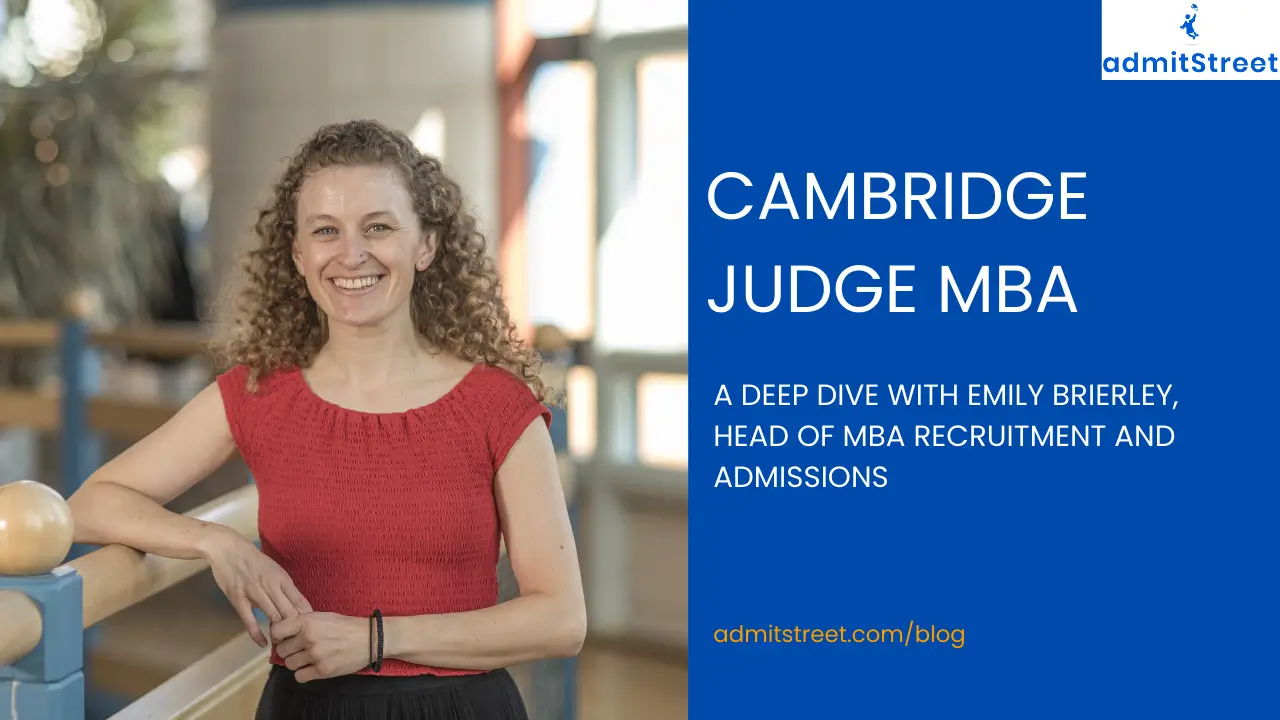Judge Business School has been ranked #6 worldwide (QS Business School Rankings 2024) and offers a holistic 1-year program for professionals aiming to transform their careers.
The 2023 MBA class size at the Judge Business School was 226, with the average pre-MBA experience being 6 years and the average age being 29 years. 45 nationalities are represented in the cohort, with 42% female representation.
Within 3 months of graduation, 94% of the candidates accepted job offers, with finance being a strong focus recruiting 30% of graduating candidates. JBS’s cross-cultural learning experiences, focus on consulting, marketing/ sales, general management, and leadership, and its global exposure have resulted in the program being consistently recognized in global rankings.
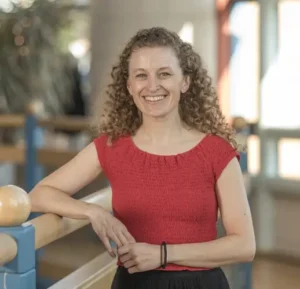
Arvind Kumar (Founder, admitStreet) and Tweesha Taneja (Senior Consultant, admitStreet) interviewed Emily Brierley, Head of MBA Recruitment and Admissions at Judge Business School, Cambridge University, to cover topics ranging from the JBS MBA admissions process and curriculum to post-MBA careers, scholarships and other lesser-known aspects of the program.
Q&A with Emily Brierley, Head of MBA Recruitment and Admissions at Judge Business School
Cambridge Judge MBA: Intro
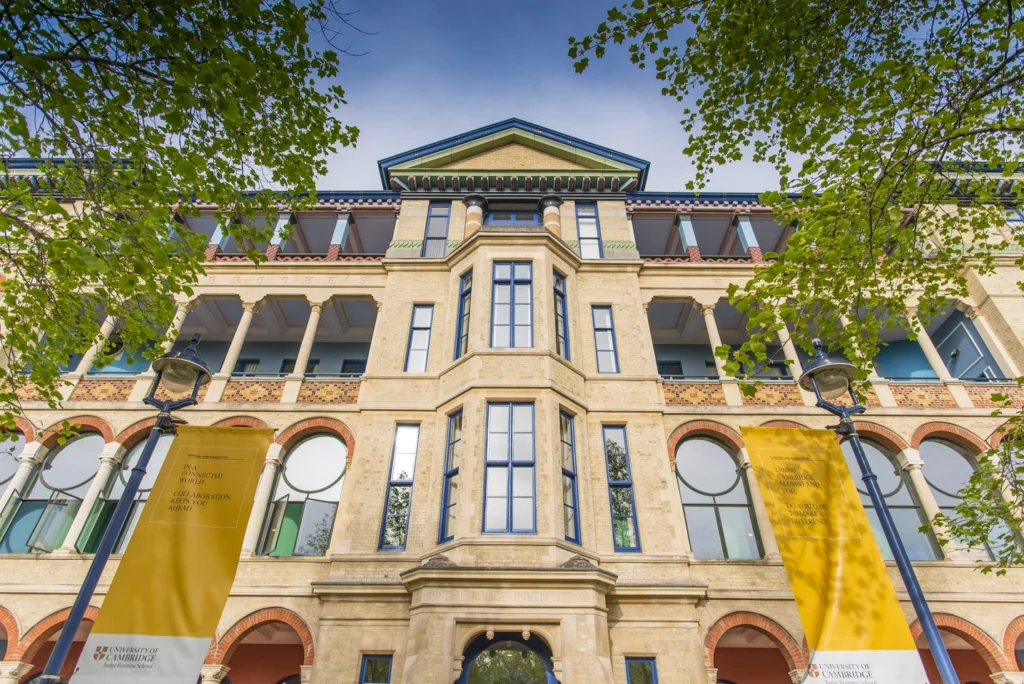
admitStreet: What are some unknown facts about the Cambridge MBA that you’d like to share with applicants?
Emily: Being a part of one of the 31 Cambridge Colleges is an incredibly special part of the experience for our students and allows them to develop an extensive and dynamic network, outside of the MBA and other business students. The great thing about the colleges is that they’re multidisciplinary, so you never know who you’re going to meet!
You could be having dinner with a philosopher one evening, and a mathematician the next. We have had many MBAs meet future business partners in their college!
Cambridge Judge MBA Admissions: Steps, Essays, Interviews

admitStreet: Could you decode the process of how JBS applications are evaluated? Who evaluates them, and what are the steps involved from when an application is received to when a final decision is rendered?
Emily: Applications are reviewed multiple times by different members of the Admissions Committee – this is to ensure that each candidate gets a fair review. The Admissions Committee consists of members across the MBA teams and faculty.
I always advise candidates to remember the number 3 when applying to Cambridge. Within 3 weeks of submitting your application you should expect the outcome of whether you’ve been shortlisted for an interview; 3 weeks after that the interview should take place; and around 3 weeks after that you should expect the outcome. Bear in mind it may be more or less than this in each case.
admitStreet: There are 5 application rounds. Do you see a balanced number of applicants across rounds, or are any round(s) more crowded? Do chances of admissions/ scholarships reduce towards the later rounds, particularly for international applicants?
Emily: We always recommend that candidates apply early where possible, and you would find that most business schools would advise the same. For Cambridge, this is because more funding is available in the first three rounds – we have some scholarships that are only available in Rounds 1-3 and not in the later rounds. Some of our scholarships are also rolling until awarded, so it’s best to apply early to give yourself the best chance of securing funding.
Another consideration for applying early to Cambridge is the colleges. As well as studying at CJBS, students on the Cambridge MBA also become a members of one of the 31 colleges, which is a massive plus to your MBA and will give you the opportunity to network with students across the wider university.
Colleges close throughout the year as they meet capacity, so we recommend applying early to give yourself the best chance of getting into the college of your choice.
Similarly for accommodation, we recommend applying by Round 3 if college accommodation is a key motivator. College accommodation is never guaranteed, but you will have the best chance of securing it if you apply in the earlier rounds.
Overseas applicants can apply in all 5 rounds, along with domestic students. We do recommend that if you are applying in Round 5 and you need a visa to study in the UK, you plan ahead and try to be prepared as there is not a lot of time between receiving your offer and the start of the MBA program, so you need to be organized!
As of next year, we will have 4 rounds and not 5 and we will offer in-person interviews in all 4 rounds.
admitStreet: Please share with us your top tips for the application essays.
Emily: The essays are your opportunity to show the Admissions Committee who you are, beyond the academics and your professional experiences. It gives real insight into who you are and what you value and what matters to you. This is important as Business Schools want to ensure that they are accepting candidates who are a right fit for the program, particularly in terms of values and ethos.
I always strongly recommend that candidates research schools before applying and ensure that the school’s values align with their own – you will find you have a more fruitful learning experience, and you want to ensure that you will be in an environment where you will thrive.
For the essays – bring your authentic self to them. We want to get to know you. Take your time and think carefully about the examples you are using. Try not to use anything too historic as this tends to have less impact. The essays are part of your narrative, and you want to ensure that you give them just as much time, as you do the other elements of the application.
And most importantly, enjoy the process! It’s not very often we get to stop in life and take stock of where we’ve been and think carefully about where we are going. I speak to a lot of candidates who find the reflective process really rewarding.
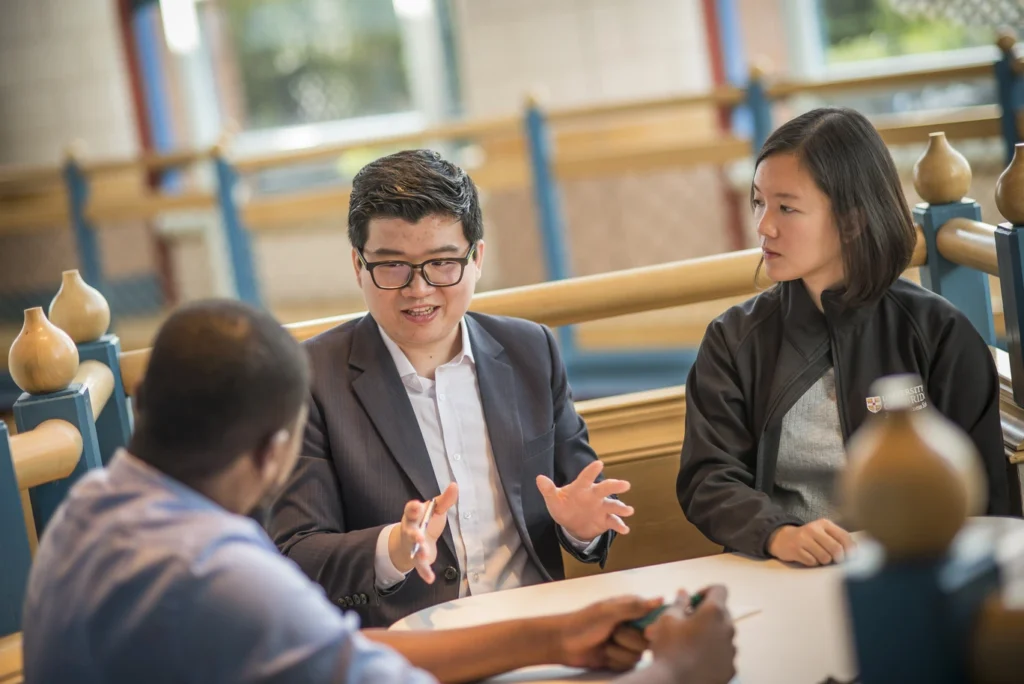
admitStreet: Tell us about the interview process once a candidate is shortlisted. Who conducts the interviews, and what are the key aspects being evaluated?
Emily: Our interviews are with faculty members, which I think is something quite unique about the Cambridge MBA. We offer both in-person and virtual interviews in the first 3 rounds and then online only for rounds 4 and 5.
The interview will be 30 minutes with a faculty member, who is really trying to determine whether Cambridge is the right fit for you at that stage. They will also assess whether you will manage the program’s academic expectations, but it is more of a conversation. Candidates really enjoy their discussions with the faculty and find it a rewarding experience. It’s also great to be interviewed by those who will teach you on the program.
admitStreet: The application includes 1 reference (Letter of Recommendation). How should candidates pick their recommenders? What makes for a strong reference?
Emily: The LOR is an interesting part of the application as it is the only part that candidates don’t write or have any input into. We only require 1 professional reference, and this should be from a supervisor or line manager. Where possible, your current supervisor, however, we appreciate this isn’t always possible and are happy to accept a previous manager in these cases.
We strongly recommend using someone from the past few years, as we want someone who can comment on your current abilities and future potential. Use someone who you have worked closely with and who knows you well and is going to be able to provide a thorough and honest reference.
Try to avoid the trap of just using the most senior person you know in your company – unless they are your direct supervisor, chances are the reference will not be reflective of your potential as they may not have worked closely enough with you to comment.
admitStreet: What is your advice for applicants who have a less conventional background (e.g. age above 30, low GMAT/ GRE, arts/ social-sector degree) or career path (e.g. multiple job switches) on how they can make their application stand out?
Emily: Everyone has their own story to tell and having an atypical background isn’t necessarily a barrier. Business Schools value diversity and it’s thinking about what you are going to bring to the program, to classroom discussions and group projects – everyone has something to bring to the table. However, my advice would be to always speak to admissions teams about your eligibility before making an application. At Cambridge, we offer profile reviews and can provide feedback on a candidate’s profile. It’s best to know before you apply, so you know what you need to work on before submitting.
My other suggestion would be to always apply when you know you are submitting the strongest application you can. Chances are you are only going to apply to MBA programs once in your life, so you want to ensure that you are bringing your best self.
Cambridge Judge MBA Academics: Curriculum, International Exchange

admitStreet: How do you ensure that the curriculum retains its rigor and practicality despite its shorter format (i.e., 1-year) compared to the 2-year US MBA format?
Emily: We pack a lot in! It is a busy and intensive year, but we want to ensure that we are setting our students up for success when they return to the workplace.
We place a lot of emphasis on experiential learning at Cambridge and have several projects throughout the year, which are a key part of the experience and allow our students to gain real-world experience in new industries or functions. This is particularly important for job seekers who are looking to pivot into a new industry but don’t have any prior experience in that area – the projects are a great way for them to gain that experience which they can later draw on in interviews.
The summer project allows our students to focus on an individual project and we find most choose options that play into their post-MBA goals, whether through the work placement (essentially an internship in everything but name), or consulting for a company on a specific problem.
The 1-year MBA program is intensive; however, our students consistently have excellent career outcomes and achieve their objectives.

admitStreet: What are some of the unique learning methodologies and curriculum/courses (e.g., live-client projects, Special Interest Groups) adopted in the JBS MBA program?
Emily: As mentioned above, a key part of the Cambridge MBA is the projects you will undertake throughout the year and the real-world application of the knowledge and skills you are learning from the curriculum.
The Cambridge Venture Project (CVP) in the first term and Global Consulting Project (GCP) in the second term, are both live-client projects, giving students the opportunity to gain experience working in a different industry.
There are also Student Interest Groups (SIG’s) that students can get involved in and of course there is the wider University and colleges clubs and societies that students can join. The Debate Society is always a popular choice with MBA’s and is a great tool for developing presentation and public speaking skills, as well as critical thinking.
admitStreet: Could you tell us a little more about JBS’s emphasis on Sustainability and Impact?
Emily: This is something that is already woven throughout all our core courses as it’s something that should be considered in all parts of business. For students who want to deep dive into sustainability and impact, we also have a Sustainability Pathway which includes specific electives, concentrations, and projects they can undertake to develop their knowledge and skills in this area.
The careers team also host a range of events such as ‘Green Careers Week’, giving students the opportunity to meet with companies and recruiters, as well as hearing from alumni who now work in sustainability.
Careers @ Cambridge Judge MBA
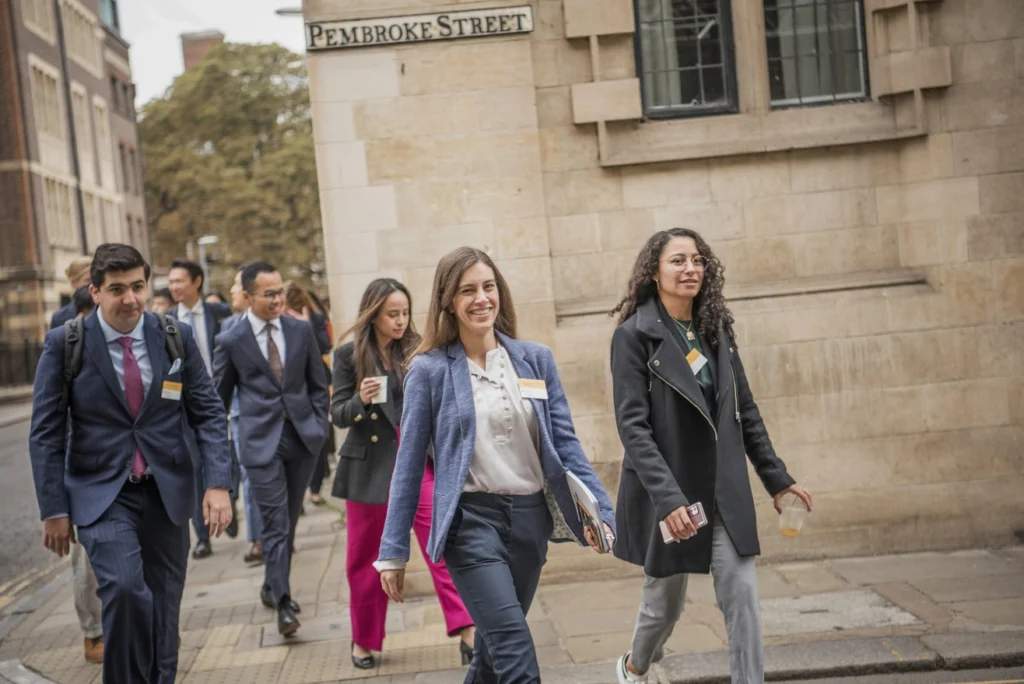
admitStreet: As per the 2022 employment statistics, 30% of JBS MBA graduates landed a role in Finance, with 27% of them taking on PE/VC roles and 25% in Investment Banking. 29% joined consulting and 15% of the candidates chose roles in the FMCG sector. Tell us about the recruitment process, particularly for Finance, Consulting, and FMCG roles, and how JBS ’s Career Services center helps students along the journey.
Emily: There is a full Careers Provision at Cambridge, and this is a core part of the experience. The Careers team’s purpose is to provide a program of; professional development; sector and functional insights; career management skills; and recruitment opportunities. We work with a range of expert consultants from different sectors to work with students individually. The team continually talks to recruiters to understand their requirements and deliver over a thousand workshops, advisory sessions, and recruitment events every year.
Our class size of c.200 allows close interaction between careers and individual students, enabling the careers team to help students build their careers journey based on a student’s motivations and goals, and signposting you to relevant workshops, 121 coaching sessions, and resources. The wide variety of recruiter events provides direct access to top recruiters and special interest groups and treks supplement the journey through specialized extracurricular activities.
The recruitment process varies between industries and the CJBS careers team has a wealth of experience and knowledge and can guide students throughout this process whether it’s through the structured hiring route or through direct hires later in the academic year.
admitStreet: 42% of JBS MBA graduates managed to do a triple jump i.e., changed industry, function, and geography. Any specific tips for candidates looking to make a triple jump?
Emily: Start your search early! It’s important that you have at least a rough idea of what it is you want to do and where you want to be. We start careers onboarding in April of each year for the incoming class that start in September. As we are only a 1-year program, we know that students really need to hit the ground running in terms of their job search, and we have a pre-MBA careers program designed to set you up to succeed whilst on the MBA so that you can begin the program feeling confident.
Make the most of the resources on offer! There is a wealth of resources you can tap into as part of your career development program, it’s up to you to ensure that you make the most of that whilst you’re here.
Finally, network!! This is one of the most important skills you will need as you navigate the MBA job market and the great thing is, you don’t need to be in the MBA program to do this, you can start this now! The careers team arranges a plethora of events throughout the year and connects you with our alumni – which is a great opportunity to talk about how other alumni did it and made the triple jump.
admitStreet: London is considered the financial capital of Europe. Could you elaborate a bit more on the roles landed by students in PE/VC and Investment Banking? How do the program students looking to pursue a career in such roles?
Emily: The Cambridge MBA is a diverse cohort, and so are post-MBA roles, locations, and industry sectors. Most of our students going into PE/VC and IB go in at Associate or Senior Associate level, with a few at VP and a few at a lower Analyst level – it all depends on the individual and what skills and experiences they already have.
The careers team will work with students individually to help build their career journey and there are lots of options in the curriculum for students interested in these areas, such as the Finance concentration and electives.
admitStreet: Could you elaborate on the career paths chosen by students wishing to pursue roles in sustainability and impact?
Emily: Our students go into a range of different industries and functions, from startups to corporates and we’ve even seen some start their own companies after completing the MBA program. What’s interesting to note is that we are seeing a lot more jobs in sustainability and impact coming through bigger corporations and a lot more crossover between industries, which is great for students interested in several different areas.
For example, moving into sustainability within finance or within consulting – allows students to leverage their different skills and experiences and enables them to transition into sustainability more easily, if they don’t already have any experience in this area.
The careers team recently hosted a ‘Green Careers Week’ which was a great opportunity for our students to meet with recruiters and hear from our alumni who have gone into sustainability and impact roles after the MBA.
Scholarships, Concluding Remarks

admitStreet: How does one apply for scholarships: are there separate scholarship essays? Approximately what % of the class receives a scholarship?
Emily: Around 15% of the class are awarded a scholarship. We also offer merit-based bursaries and around 40% of the cohort are awarded one of these.
To apply for the Cambridge MBA scholarships, candidates must indicate their interest on the application form, in the scholarships section. If a candidate is shortlisted to interview, they will then be invited to formally apply to our scholarships. Some of our scholarships are conducted via video assessment and others will be reviewed by the scholarships committee, based on your profile and contribution to industry and beyond.
admitStreet: What are your tips to applicants on how they can increase their chances of securing a scholarship?
Emily: Our merit-based bursaries are awarded based on interview feedback, bachelor’s GPA, and GMAT/GRE score. One way candidates might increase their chances of being awarded a bursary could be by submitting a strong GMAT/GRE score, although candidates must be aware that this is just one element of the review.
For our scholarships that have a video assessment, it’s important you think carefully about the award and how you meet the criteria. How have you contributed to this area and how will you contribute to the MBA program and beyond? Scholarships are highly competitive, and we are looking for passionate and driven people who want to meaningfully contribute to the Cambridge MBA.
Candidates are also welcome to provide any additional supporting documents that demonstrates their eligibility to scholarship awards.
admitStreet: Besides the online group webinars, how can applicants connect with the AdCom at a personal level, if they have any questions or clarifications?
Emily: We would recommend you email the team at mba-enquiries@jbs.cam.ac.uk this is the best way to get in touch with us directly. Attending our online events and on-campus open days is also a great way to get to know the school, the program, and the team better. We look forward to meeting you soon!
admitStreet: Many thanks for your time and insights, Emily. We appreciate it and hope this will give applicants a comprehensive overview of the JBS Cambridge MBA.


